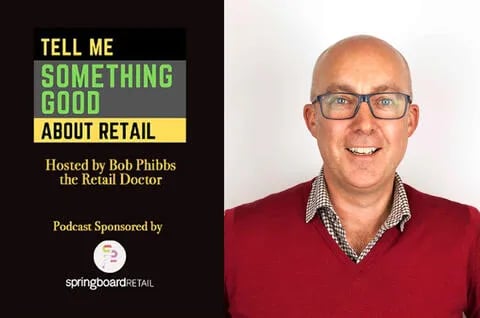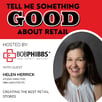Retail Podcast 410: Derek O'Carroll Creating a Retail Culture

Bob Phibbs interviewed Derek O'Carroll, CEO of Brightpearl. In this episode Bob and Derek talked about how retail winners are creating culture.

Tell me something good about retail
Derek O'Carroll: Creating a Retail Culture
Bob: What's it like over there in London today, my friend?
Derek: Well, it's very quiet, Bob. Very quiet indeed. Not many people about, everyone is trying to deal with their teenage kids and how to entertain them during this interesting time.
Bob: Well, you came through this yourself, if I'm not mistaken, in the last week or so. Right?
Derek: Yes, yes. We came down with the symptoms about 14 days ago, and it wasn't very pretty for about seven days. And then we came out the other end, had a little relapse, and we're just beginning to sort of regain energy and zap.
So, yeah, it's quite a virulent little bugger.
Bob: Okay. But see, you're on the other side of it. And, even though we are recording this at the very end of March, and, we all hope that there will be better news after we are through this, I wanted to make sure everybody understands that this is not in the moment when they hear this.
So, originally, we were going to chat about basically your success there since taking over Brightpearl, and how you were shortlisted as CEO of the Year for the Digital Masters Award. So, what does that all mean? And, basically what do you all do over there?
Derek: So, Brightpearl is an operations platform that merchants, high growth merchants who sell on multiple channels, they would use our service to handle all of the automation requirements as you orchestrate all of the jobs of work that need to be done after an order is placed on a website or in a store.
And as you guys know, there's a lot of complexity that arises if you want to maintain a very high level of customer service, and you have to have a system that gives you visibility all the way through that process. Both ways, you know, reverse logistics included. So that's what we do. The company was set up by an actual retailer, just over 10 years ago.
And, they got it to a certain point. And I joined in 2016 in May, and, essentially have brought to bear a couple of changes in our go to market strategy, primarily, to focus on the U.S. actually, which has been very successful to date. Yeah. But that's what we do.
Bob: Okay. And you know, we originally were going to talk about the rise of the review culture and, you know, if you go back probably 10 years ago, people were poo-pooing, “Why would I care what anonymous people think, when I don't know who they are?”
And yet, that's totally the opposite way now. I can't imagine anyone saying reviews don't matter.
Derek: Oh, yeah, no, and I think now that's there's a huge body of evidence, which we were chatting about earlier. We did a survey of 400 merchants or retailers in the USA late last year, and 2,000 consumers. And we were trying to correlate the connection between good reviews, bad reviews, and then what were the behaviors of merchants that were causing those. And, what we saw was a connection, whereby the root cause of a bad review, is the same, inversed, for a good review.
And the root cause would be things like, “I ordered a product. It arrived and the product was different in the box.” In other words, someone had made a mistake in the warehouse. Or, “I didn't get the product for two weeks or three weeks” and so on and so forth.
And we analyzed 75,000 reviews and we found human error to be the number one root cause of that review being placed as a negative review, but also positive. So, it's the same side of the equation.
Bob: For a minute I thought you were going to say we need to get rid of those damn humans and more robots.
Derek: No, no, definitely not. I think it's when you have humans do tasks that, you know, humans find tasks that can be difficult, that computers will find easy and the inverse as well. So, you shouldn't have humans doing repetitive jobs of work. We should get automation to do that where possible.
Bob: And so, is that something that particularly direct to consumer brands need to look at? That's interesting you say about the repetitive nature. I mean, you know, Henry Ford started basically assembly line back many generations ago and he was considered the one guy who figured it all out, except that you had to pay people a lot of money if they were going to go through and do the same thing every day, right?
Derek: Correct. But the one thing he didn't have in his factories was he didn't have high attrition of staff, which retailers do today. So, what we found is merchants, both in the physical world and in the virtual world that have warehousing, they really do have to deal with a very high degree of staff attrition, people moving on.
And it's in the high 60s, which we were quite surprised at, within the market. So that means that every time staff move on, you have to retrain. And if you don't have repeatable processes that you can bring to bear quality repetition by individuals, you start running into this issue and it becomes really bad at high peak periods, you know, when you're busy.
Bob: So, do you think, I didn't mean to interrupt, do you think that the high attrition is due to people look at this job as a stop gap or a temp job more than they used to, or is it that they get burned out on it? They don't realize what it will be like when they sign up?
Derek: I think it's a mixture of both and it varies, I think where we see brands really focus on culture and their team, we see very low levels of attrition. So, it is down to how a company owner thinks about “How do I look after my staff?”
Because the connection with low cost, high turnover staff and poor reviews is pretty much very evident now within the body of evidence that exists. So those brands that owners really focus on, “How am I going to look after my people?” they're the ones that actually do quite well in terms of, they don't expose themselves to that attrition.
Bob: So, would you say that's like the number one thing that smart direct to consumer organizations understand or put money behind or you know, or are they just lucky? There's a great brand, somebody loves working for the brand, so they'll put up with anything, I don't know.
Derek: Yeah, no, it's definitely not. Look, I think there's a couple of areas to look at. One, accept staff attrition will be very high, and that's the first thing, and plan accordingly for that fact. Then the next question is, how much time do you as a business owner put into developing training routines for your staff in all departments?
And retail is a funny segment, but their focus on training is very, very low. Which sort of is weird because the attrition is very, very high.
Bob: I was going to say that's the world I work at is training. And it's always a “Nice to have,” not, “It's my competitive advantage.”
So, you know, I typically find people who are looking for training find that I'm the answer, but trying to convince people who don't believe training is the answer? They're off, “Oh, we’ve got to have more social media influencers. Oh, we have to more discounts. Oh.” And it's like you're shooting the arrows totally away from the bullseye.
Let’s be honest here, after we come through this, which I know we will come through it, how are retailers going to up their customer service? Cause I don't think they can go back to a warehouse, a pretty product where someone says, “Hey, I can help you find something? Do you have a budget? Let me know.”
I just don't think that's going to be compelling.
Derek: It's amazing. A lot of people come to us and they say, “Hey Derek, I'm growing really quickly and I want an operations platform and I've looked at your website. It looks great.” The first question we ask them is, “Well, do you understand the customer experiences that you're hoping to offer in all the channels you sell product on?”
And they look at us blankly and go, “What? What do you mean? And so, well, you know, have you actually mapped out the journey you want your customers to go through as a team before you hire anyone, before you open that new warehouse? And I would say, eight times out of 10 the answer is, “No. We haven't had time to do that because we're too busy.”
So well, why are you thinking about buying a new back office operations platform if you haven't mapped out the journey that you want to offer your customers? Just conceptually, and then that usually gets the right conversation going. And you know, as CEO at Brightpearl, I spend a lot of time getting customers to really focus on what's important before they come to us.
Because once they come to us and we invest, it's a partnership because we're a mission critical platform. You know, we're doing everything from logistics to order management to accounting. We have to be successful. So therefore, we're very focused on making sure clients who come to us have already thought about what they want to offer, and then we can plug in underneath that the power of the platform that we have.
But it's amazing how many customers just haven't had the time to go off of work at those experiences that they want their end customers to enjoy.
Bob: Well, see, that's my thing is that this big reset we are going through in retail right now where stores are closed for anywhere from three weeks to, you know, some, probably two or three months, is this opportunity to reinvest and say, “You know what? We can't say I don't have time now.”
So, what do we use it for? Because I think once that time passes, you know, I've said, in America once major league baseball gets back to business. I think we'll feel like there's some normalcy here, even if they're not playing to full stadiums.
Once that happens though, you're going to be right back in it, which is going to be, “Oh, we don't have time to train. Oh, you don't have time for this.” And that chasing your tail, it's kind of what's gotten a lot of retailers in trouble right now where you haven't really stopped to say, “How are we different from the other guy? What is our brand or shopping experience?”
And then, how do we not only train, but hold people accountable to deliver it? And until you're willing to do that, I think you settle for crumbs when you could probably have a feast.
Derek: Yeah. And I think that the characteristics that you've just summarized there, we see in companies going from the 3 million turnover per year up to the 10 million.
They don't get past the 10 million unless they are very customer centric in terms of their processes and workflows. They don't get past 10 million if they haven't got a really good idea of the culture and the filters that they want their employees to use when making decisions when they're in the room with them, and that's what really culture is all about.
And those two attributes, underpinned by good training as we said, they are the three sort of characteristics of companies that make it past 10 million - above and beyond having a cool product. If you don't do all those three as well, your chance of getting past 10 million are pretty much negligible.
Bob: Well, number two, is really, I haven't heard somebody say it quite that way. Can you unpack that more, Derek? I really liked that idea about, it's what they do when you're not around. That's what culture is. It's not, “Oh, we go and we do fun virtual hangouts every Friday. Right? That's not culture.
Derek: Exactly. Yeah. A lot of people I speak to talk about, “Well, I'm going to go off and develop my company values.” And I said, “Well, what's that mean?” They said, “Well, I want to be innovative. I want to be curious. I want to be a customer first, and then we'll come up with a load of soundbites.” And then we'll say, “Okay, well that's great, but does your team buy into that?”
And they say, “Well, what do you mean?” So, you can set the vision, but then they have to help you set the values. But then the values for any new person coming in the door, they're not for them just to repeat. They're them to use. Okay. When I'm faced with a decision to make and you're not in the room, how am I going to use the company values to try and make the right decision.
And, it's like having everyone in your team speak the same language. And that's the oil in the culture engine, so to speak. It's not coming out with our culture is these five words that we're going to stick up on the office wall. It's much more in depth, much, much more in depth.
And a lot of folks that I speak to in the 3 million GMV world, they have culture coming out of their ears as individuals, but they're not able to create a format and a forum for everyone else to buy into that culture because they flip into the, “Well, I don't trust anyone else to do it, I'm going to dictate. They do everything the way I want to do it,” and then they don't scale and that's the real challenge here.
Bob: Yeah, it's like you had a thing to do. It's like we have to do culture admissions. Okay, great. I came up with it. I stuck it on the board. This is our corporate values. And we were like, “Hm. That's your values.” And until enough people say, “I can sign onto that,” it's just, you're kidding yourself. Right?
Derek: Yeah. And, the thing about culture is, when an owner is engaging with their team to try and nail this really important issue, they've got to differentiate between current culture and aspired culture because you can't mix the both.
You've got to understand what your current culture is within the team and that needs to come from the group and what you aspire to because that's the whole point of a culture. You're going on a journey as a team. And a lot of folks I I chat to as they go through that sort of high growth phase of being a successful merchant, the ones that really get it, they understand the difference between the aspired values that drive the culture and ones that are the current, which you need to either build upon or evolve away from.
Bob: Yeah, I was just thinking, as you said that, of the documentary on Enron, which was the big energy firm in Houston. And when you saw the documentary on it, it was like, “Holy crap.” It was the wild, wild West and every man on his own and whatever you can get away with, get away with it. “And we're going to be laughing at people and this is our culture.”
And ultimately that really was unmanageable for anybody. And I think to a lesser degree, that's what goes on with a lot of businesses where employees are “Just do the best with what you think, whether that's what we would do or not.” And, yet it sounds easy to create culture. It's a lot of work, right?
Derek: It's a lot of work, but it also teases out other key questions. We have a cool product that's our functional differentiator, but what are our non-functional differentiators? So, for example, I'm aware of a company that sells sex toys, for example, or health care products, and they're nonfunctional differentiators.
When you call their support line, their support goes that little bit further. In other words, they give you personal advice on how to use the product and that's their nonfunctional differentiator as opposed to just their product.
And that's what I mean. It’s that when you have a discussion with your team around what's our culture going to be today and aspirational, it helps you really zero in and asks the questions, “Well, how are we going to do things differently? Why are people going to go that extra mile for us?” And that's the nonfunctional differentiator and that that's just one example that I gave you, but too many companies are out there today and they build a product and they say, “That's it, we’re done.”
And, it's just not good enough in today's world because someone can copy you within two months or three months. But it's very difficult to copy culture. It's nearly impossible.
Bob: No, I would agree with that. And, you know, as we're coming out of this, virus pandemic, you know, people are saying, “Oh, online's going to be the big winner. All the onlines are going to sail all over the brick and mortar, and I'm not so sure about that because quite simply it seems to me it's going to be much harder for a D to C brand to cut through.
You've got your CBD oil face cream, you know, how do you possibly scale that against all of the other brands that are out there?
And, I go back to, at least in the United States. The brands that won are the brands that we've known for decades, like Clorox, like Purell, like all of the Kleenex, all of these other brands who people were taking out of the store. So, any thoughts about that difference between brick and mortar and online as we come out of all this?
Derek: Well, the brands that are strong today, they evolved by getting traction with young consumers maybe 20 years ago or 25 years ago. So, if you're an online brand, be very cognizant of the importance of targeting your age group that are going to be the power buyers of tomorrow or the people with cash in their pockets tomorrow.
And so if you target so that the 15 to 25 year old or 18 to 30 year old, whatever it is, relevant to your product, and then be very specific about, well, why are they going to talk to each other? How are they going communicate with each other and what's the stereo sound going to be about our brand?
And nail that and really focus on that. And that might be amazing customer success or customer service as we said, it might be including them in product design decisions, whatever, but I think that great brands will get built out of young buyers today and be built on the internet through the influence channels that exist, like social.
Bob: And so what kind of advice do you have for retail owners right now? I mean, I don't expect you to have all the answers, but what would you tell somebody? Here it is sometime in May, let's say June.
Derek: Well, I think there's an opportunity to come out of this stronger by using the one thing that we never have enough of, which is time and time is money. It's an old cliche, but you use that time to go back to basics because if you go back and redesign your business, theoretically with your team, and start off with the market you want to operate in. What's your strategy going to be to win in those markets? And then start with your customer experiences that you know you want to offer to differentiate yourself above your competition, of which there will be many, and map that out whilst you're in this quiet period.
And then build a plan with your team to execute upon that. And then that obviously your suppliers will pop out of that. Yeah. What's the system you're going to need for the back office and so forth, which is where Brightpearl would come in. But just use the time to go back to basics because, you know, it's the one thing we've got control over.
Bob: Tell me something good about retail. What do you love about retail?
Derek: Well, what I'm loving at the moment is the winners and the losers, so to speak. You know, as we go through this Covid-19, and I know this is a March recording, but what we're seeing is a huge increase in anything to do with the home.
So people are buying a bunch of product to, make their homes better, get healthier, from vitamins to health care products, to DIY tools. And, then people are buying less fashion. Cause obviously they're not going out. And we would just expect that to flip now over the next sort of two, three months as confidence returns.
And hopefully as your listeners listen to this broadcast, it will be fashion back on top because it’s going to bounce back out of this period of lockdown.
Bob: Yeah, I totally agree. How do we find out more about your company and you?
Derek: Just go to brightpearl.com and everything about us is there. And I'm on LinkedIn and Twitter under Derek O’Carroll.
Bob: And there you go. Well, good. Well, I appreciate you joining us here today.
Derek: Good stuff, Bob. Thanks very much.

Find out more about Derek

Take My FREE Retail Assessment Quiz
Use this free Retail Assessment Tool to discover where you truly excel in retail, and uncover areas for improvement.


